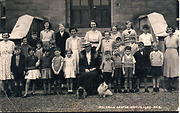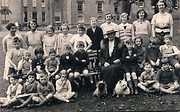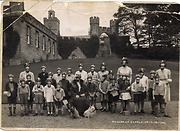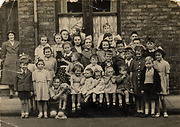 Hartlepool Sports & Leisure
Hartlepool Sports & Leisure
- Cinemas, Theatres & Dance Halls
- Musicians & Bands
- At the Seaside
- Parks & Gardens
- Caravans & Camping
- Sport
 Hartlepool Transport
Hartlepool Transport
- Airfields & Aircraft
- Railways
- Buses & Commercial Vehicles
- Cars & Motorbikes
- The Ferry
- Horse drawn vehicles
 A Potted History Of Hartlepool
A Potted History Of Hartlepool
- Unidentified images
- Sources of information
- Archaeology & Ancient History
- Local Government
- Printed Notices & Papers
- Aerial Photographs
- Events, Visitors & VIPs
 Hartlepool Trade & Industry
Hartlepool Trade & Industry
- Trade Fairs
- Local businesses
- Iron & Steel
- Shops & Shopping
- Fishing industry
- Farming & Rural Landscape
- Pubs, Clubs & Hotels
 Hartlepool Health & Education
Hartlepool Health & Education
- Schools & Colleges
- Hospitals & Workhouses
- Public Health & Utilities
- Ambulance Service
- Police Services
- Fire Services
 Hartlepool People
Hartlepool People
 Hartlepool Places
Hartlepool Places
 Hartlepool at War
Hartlepool at War
 Hartlepool Ships & Shipping
Hartlepool Ships & Shipping

Evacuation by Joan Ralton
In 2005 Hartlepool's Museum and Library Services worked together on a project called 'Their Past, Your Future', which commemorated the part played by local people in the Second World War. As part of the project Joan Ralton reminisced about her childhood and being evacuated. This is her story, in her own words:
I was seven when war broke out. At that time we lived in 29 Colwyn Road. There was my brother and myself and both my parents. My dad was a fitter at Head Wrightson’s in Brenda Road, which was a reserved occupation, then he went on to work for the army, but I can’t remember what he was doing.
I remember it was my birthday on the 22nd of September and I remember saying to me mam “am I going to get a birthday present now Hitler’s coming?” and she said “well, it all depends whether Hitler gets here or not.” I was at Lister Street School and it must have only been a week, two weeks after war was declared that we were sent on this rickety old bus to Mulgrave Castle at Lythe near Whitby. To us it was a big adventure but I felt safe because my mam was coming with us as well. There was three mothers went with all these kids from Lister Street. A lot of them were a lot poorer than I was, so they were probably a bit more independent than me and my brother was. So to them it was like fairyland, obviously. We got to this magnificent place, this lovely castle. I think the biggest thing that impressed me was with having the old tin bath hanging on the wall at home, and Friday night that tin bath used to come in the back kitchen and then to see this magnificent big bathroom, this big white bath which had got a dozen people in, I think. It was beautiful. We stopped in one side of the castle, we didn’t venture. Mind, we did explore, sometimes. But the Marchioness of Normanby and her secretary were on the other side. I believe the Marchioness’ son was taken prisoner very early in the war - she was always in black, a very regal lady. She didn’t mix with us a lot but now and again she used to go past and pat me on the head. We slept in the chapel. We all had our little camp beds. Unlucky me, there was the alter with the big white cloth on, and I got the camp bed next to the alter. Considering I was only seven, I was horrified of the alter, and I used to cry myself to sleep every night and all the kids used to say “there’s ghosts in there! There’s dead bodies underneath that white cloth!” Which was very unfair and I was really frightened, but I got used to it after a while. And little Tupper who perpetually wet the bed! And he did get into trouble for that but he was only about six.
A lot of the kids didn’t really get homesick ‘cos to them it was a big treat. But my mam stopped three weeks and I think that was worse than being left straight away because I remember trying to catch up with the bus that was taking her away, and crying, and saying “ come back, mam!” but she had to go home for me dad, you see. For the first three weeks that mam was there, she looked after us. But in the castle we had the butlers in lovely black suits with silver buttons on; the maids, who were dressed up with the white caps on and the black aprons. Personally, I think they hated us! But they looked after us. And there was the secretary, Miss O’Brien, who was a lovely lady. I always remember she took me down to the forest one day. She said “we’ll go for a walk and get some food”. In my little mind I thought “how can you get food in a forest?” And we came to this big wooden trap door and she said “follow me down the steps” and of course, obviously in them days there was no fridges, so down we went and it was icy cold down there. She said “this is the larder”. There was all this food down there. Joints of meat and tins, loads of food. She put all this stuff in a big basket and give me a little basket to carry. She said “we’ve got to take this back to the castle now, for the cooks”. It was the kind of food we didn’t get at home. I remember all of us sat at this big table and we got cornflakes or porridge but mam was sitting next to me and she got bacon and egg. And I used to say to her “can I have a bit of bacon?” and she would say “we’ll have to wait until nobody’s watching” and then she used to slide me a bit of bread with some bacon on underneath the table because that was only for the grownups.
And then the winter came and it got colder and colder. We had a little cloakroom to put our coats and wellies in and there was always a big charge to get the wellies. And I always got left with the odd one. There was always one wellie that didn’t have another one to it. And I remember saying “I want to go out and play in the snow!” John, the butler, he used to pick me up on his shoulders and run me round. And then one night we decided to explore. We knew there were certain parts of the castle we couldn’t go in, but we were getting bored so we explored. And we found this hall and there was a stage, so obvious it was a theatre that they must have used in years gone by. We crawled underneath and we found all these old-fashioned gowns and shields and things like that. And we used to go in the forest. The favourite occupation was conkers. There was big windows in the castle and we used to get up on a morning and we could see all these rabbits running around like something out of Walt Disney. We’d never seen anything like it in our lives. For schooling we went down Lythe bank – it’s horrendous! And for little legs! And we went to this little village school; we sat on benches. To the other kids we were like creatures from another world. They were country kids. I can’t remember too much…I don’t think we learnt very much. Then we all had to trudge back UP the bank! Christmas was lovely. The decorations were out and you had a special meal. Everybody was happy and even the Marchioness was there. I think I got a little doll with a bow on.
People were very good to us on the whole, but I was very homesick, especially when mam went, and I was just a skinny little kid. She used to write to us but it was difficult for her to get there. There was no car. She used to have to get a bus and it took an eternity to get there. And she didn’t have the money to come very often. I was there for about a year. I left first, I think. Shortly after that the soldiers took over so everybody was cleared out and the army went in and it was used as a training place. The Marchioness did her bit, but bye, I bet she was glad to get rid of us! So most of them came back home when the army moved in. The bombings were still going on, though. In Colwyn Road the bomb dropped and I think they killed one person and blinded the father. Oh, and then there was the gas masks! Oh, them gas masks! I still have claustrophobia – still! When that photograph was taken in the gas masks I was suffering (see gallery below - Joan is on the right of the Marchioness). And they used to have to literally force it on. And they used to have mock air raids. They used to blow a whistle. And when the whistle blew we all had to go down this long corridor and sit on each side and put our gas masks on. Well, they must have had a right tussle with me because I absolutely hated it. I can still remember the taste and the smell of the rubber. And ever since then I have had claustrophobia.
Rationing was very severe, but I was lucky ‘cos I never used to eat anything! I was such a skinny little kid, and food didn’t bother me, really. But I do remember when rationing ended. We used to make do with cocoa powder with sugar in and dip our fingers in – that was sweets for us. But it was in the market, and word got round they were selling jelly with peanuts in and it was sweet. So there must have been thousands of kids all hurtled down to the market and stood in a queue and it was LOVELY! And I used to like cans of egg powder. Mam used to make lovely omelettes with this egg powder. And we had this little duck in the garden, we called him Gander. Mam was feeding him religiously and he was getting fatter and fatter and he had the garden like a quagmire. He got the tatie peelings and a few odd carrots now and again. He was our friend. So it was getting near to Christmas and we came home from school one day and he was gone! Mam said “he’s dead, Joan, he was getting too fat and he just died.” I cried and me brother cried. So Christmas day dawned, and of course in them days if you got a chicken or anything else you were damned lucky. And here’s this lovely, brown…we thought it was chicken. It looked smashing! Then all of a sudden me mam started to cry. It must have twigged with us. I said “It’s Donald!” “Get it eat” me father said. And we couldn’t. Me dad ate the lot, ‘cos we didn’t want it. I found out later she’d got Mr Fountain, the butcher, to come up and wring his neck. Me mam must have cried through all the cooking of him. But it was all out of desperation, you see. I really don’t know how mam managed, now I look back. She always had a meal on the table. If there was a queue, it didn’t matter what it was for. Mam used to say “there’s a queue up there, get yourself up.” So we just used to stand there, at the end of the queue!
Mam used to fiddle the Black Market now and again and go and get some chocolate from a shop in Stockton Street. She had to pay over the odds – I don’t know where she got the money from. She once got a tin of salmon, that was a great treat. And I got a banana once, I always remember that. It was the first banana I’d seen and I didn’t know what it was. Mam said “it’s a banana. You take the skin off and you eat the inside.” I said “I don’t want to, I want to keep it.” So I took it to school and it was getting blacker and blacker and blacker. I passed it all around the ones who hadn’t got a banana… “I’ve got a banana!” I was like the Queen for a day! Actually it went on for two or three days and the banana got rotten. Mam said “you’ll have to eat it or I’ll put it in the bin.” I peeled it and it was solid black. I said “Is this the way it’s supposed to be?” She said “no, it’s rotten – now you haven’t had a banana!”
And it was an exciting time, the war, for us kids. I remember once, there was Brian Howard, my brother and me waiting round by Strathmore House at the bus stop and there was a wall behind us. And a great big RAF truck came round the corner. We found out later it was big steel ovens they had on it and one of them fell off. And you can imagine this great big huge oven hurtling towards us. And I remember me brother saying “jump, Joan, over the wall!” And poor Brian didn’t get over and it caught his leg. There were three young RAF lads and I remember them saying “oh, hell, we’re in for it now!” They took him to hospital – eh, we were lucky ‘cos if we hadn’t jumped over that wall we would have been killed. Brian had a badly cut leg. I was a very good cricketer - I used to play with the lads. And swinging round the lampposts. We used to tie a rope round the top and spin round. Our garden overlooked the Burn Valley so we used to climb over the wall and dodge the chap in charge with a stick. We were all terrified of him – a tall, thin bloke with a stick and he’d wallop you with it if you went on the grass. We used to go and catch tadpoles.
The air raid shelters were horrendous, really horrendous. Two men came round and dug the garden up and fitted this Anderson shelter in and they said “you’ll be quite safe now” and that was it. But oh, dear me how I hated it! Mam used to drag us out of bed and down we’d go among all the wet and the cold, because it was September when war broke out, so it was obvious the weather was bad. It was damp and it was cold and there was earywigs and snails, you name it, it was horrible. They put the shelters in just when the war started. There was one big rush for air raid shelters by people who had gardens. Then they built the big shelters further down the road, they were built of solid concrete, where people from the streets could go to.
As soon as the air raid siren had gone we all piled into the shelter. We were all frozen; there was no heating in there, we were all wrapped up in blankets. “I’m sick of this” my dad used to say. He used to go outside and shout and swear up at the searchlights. And if he saw a plane all Hell was let loose! As if he would have made any difference! And he was only a little man. The German planes used to perpetually go looking for ICI, but that was covered in darkness. They never got it. One night he was coming out of work at Head Wrightson’s, cycling along the road and they looked up and this German plane swooped down; he’d seen them, the swine! Next thing dad knew there was a rat-a-tat-tat and he was machine-gunning them! They all jumped off the bikes and jumped. Fortunately, there’s hedges along Brenda Road and they jumped into the hedges. The plane rat-a-tatted away all the way down the road, but he never shot anybody as far as I know. We got him when he went over the coast and shot him down. Dad was overjoyed about that, it made his night. He was puffing away on his tobacco saying “ha! You need shoot at us, you swine! It serves him right!” He was shooting at civilians! He spotted them and came down low. So he deserved to get shot down.
On VE-Day Auntie Maud, she was a dressmaker, she made me a suit with a funny hat. Everybody rallied round, it was a great occasion. Everybody was happy and we all got dressed up as best we could. That photograph was taken in Grassmere Street (see gallery below), but lots of streets had parties. All the mams’ made cakes if they could and sandwiches all on trestle tables. It was great but it was sort of an anticlimax, because even when the war finished we still couldn’t get much, things were still rationed for a long while. When I was about fifteen and the war had finished we used to go to Seaton a lot and on the beach there was all these men in these uniforms with a “V” on the back- they were prisoners of war. And they were clearing the beach of mines what had been put down. We were fascinated ‘cos they all seemed very handsome to us; they were young and most of them were very blond; they were Germans, some were Italians. Some of our lads were there watching them but they weren’t going to do anything, they were too busy concentrating whether they were going to stand on a mine. We used to talk to them from a distance. I talked to one of them and he said “yes, I fought in the war.” I said “yes, but you didn’t win, did you?” He said look, and he lifted his arm up and underneath was “SS”. He was only a young lad. There was a prisoner of war camp at Greatham near Sapper’s Corner and at Rift House. The Italians were up near Newton Bewley and we went up there to survey them. One of them said to me ”come here, little girl” I looked at him in terror but I toddled up to the wire and he gave me a bar of chocolate. Now I look back, I think how come you could get chocolate and we couldn’t get chocolate? But I daren’ t eat it in case it was poisoned so I took it home. I took it home and told my mam I got it from an Italian man….”It’s poisoned!” she said. She showed it to dad and he said “get it eat, there’s nowt wrong with it!” But they were just young lads most of them, and they were glad to be out of the war. I knew someone who married a German, who was a prisoner of war here.
Everybody was far more friendly in them days, I found. We just lived as best we could.
Related items :
 Home Front - Second World War
Home Front - Second World War
A selection of images and documents relating to the 'Home Front', during the Second World War.
More detail »







